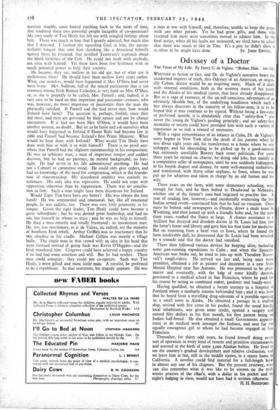Odyssey of a Doctor
The Time of My Life. By Harry C. de Vighne. •(Robert Hale.' tos.641.) WHETHER as fiction or fact, and Dr. de Vighne's narrative bears the unadorned impress of truth, this Odyssey of an American, or origin- ally Cuban, doctor would be an inspiring story. Much of it deals with external conditions, both in the western states of his youth and the Alaska of his medical career, that have already disappeared. But as a saga of resource, of the un-self-conscious adventures of an obviously likeable boy, of the underlying kindliness which such a boy always discovers in the majority of his fellow-men, it is to be hoped that it may continue to be typical. Without being a fire-eater or professed apostle, it is abundantly clear that " safety-first " was never the young de Vighne's guiding principle ; and no safety-first mentality or society could have provided him with such a variety of experience or so rich a reward of memories.
With a vague remembrance of an infancy in Cuba, Dr. de Vighne's story begins in New York afier the death of his parents when he was about eight years old, his transference to a home where he was unhappy, and his absconding to be picked up by a good-natured but extremely unreliable Bowery back street politician. For some three years he existed on charity, by doing odd jobs, but mainly as .a competitive seller of newspapers, until he was suddenly kidnapped, to his. boyish disgust and dismay, by some well-meaning authorities, and transferred, with thirty other orphans, to Iowa, where he was put up for adoption and taken in charge by an old farmer and his wife.
Three years on the farm, with some elementary schooling,- were enough for him, and he then bolted to Deadwood in Nebraska, whither one of the farmer's sons had migrated to practise law. A year of reading law, however,—and incidentally witnessing the last Indian armed revolt—convinced him that he had no vocation. Once more he bolted, sold newspapers in Omaha, drove a mule team in Wyoming, and then joined up with a friendly hobo and, for the next three years, warned the States at large. A chance assistance to a brilliant but decayed and drunken doctor in St. Louis led him into the latter's home and library and gave him his first taste- for medicine. But on returning from -a brief visit to Iowa, where he found the farm intolerably dull, he discovered that St. Louis had been-wrecked by a tornado and that the doctor had vanished. .
There then followed various devices for keeping alive; -including some gun-running expeditions to Cuba ; and when the Spanish- American war broke out, he tried to join up with Theodor; Roose- velt's rough-riders. He arrived too late and, being once more penniless, obtained a job as painter and decorator in a new State Mental Hospital near San Antonio. He was promoted to be phar- macist and eventually, with the help of some kindly doctors, gravitated to a medical school in San Francisco, where he paid for his course by acting as combined stoker, gardener and handy-man.
Having qualified, he obtained a locum tenency in a hospital at Portland 'where a motherly matron befriended him ; and it was here that he heard from a travelling drug-salesman of a possible. opening in a small town in Alaska. He obtained a passage in a trading ship, arrived with five cents in his pocket, found the usual kindly local inhabitants, was given some credit, opened a surgery and earned fifty dollars in his first month, his first patient being an Indian half-breed. He also obtained a small Government appoint- ment to do medical work amongst the Indians, and sent for the equally courageous girl to whom he had become engaged in San Francisco.
Thereafter, for thirty odd years, he found himself doing every sort of operation in every kind of remote and primitive circumstance, and assisted at the birth of some 3,000 Alaskan babies. He lived to see the country's gradual development into relative civilisation, and we leave him at last, still in the middle sixties, in a sunny home in California. A novelist could find material for a full-length book in almost any one of his chapters. But the present reviewer, who can also remember what it was like to be sixteen on the mid- winter prairies of the 189o's, with a dollar in his pocket and no night's lodging in view, would not have had it written otherwise.
H. H. BASHFORD.


























 Previous page
Previous page